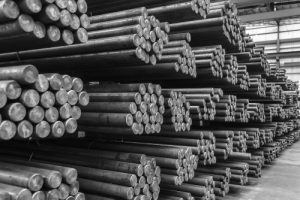
U.S. Sen. Todd Young (R-IN) has recommended against the United States issuing any sweeping global or multi-country tariffs and instead should restrict China’s imports of steel and aluminum, which he says are threatening industries in his home state of Indiana.
The Chinese are “violating the international rules, stealing our intellectual property, and overproducing steel products and other products,” said Sen. Young during a Feb. 13 meeting on trade matters with President Donald Trump and a bipartisan group of 19 members of Congress at the White House. Also in attendance were U.S. Vice President Mike Pence, U.S. Trade Representative Robert Lighthizer, U.S. Commerce Secretary Wilbur Ross, and National Economic Council Director Gary Cohn.
Trump currently is considering options given to him last month by the U.S. Commerce Department in corresponding Section 232 investigations into whether import restrictions on steel and aluminum should be made to protect national security. Sen. Young suggested that any final Section 232 decisions specifically target Chinese overproduction, which he considers the source of the problem, though he recommended a balanced approach to mitigating the problem.
Section 232 of the Trade Expansion Act of 1962 directs the Commerce Department to examine foreign competition’s impact on American industries considered essential to national security. Secretary Ross in January submitted two investigations by the department related to steel and aluminum imports and their impact on the United States to President Trump, who has 90 days from the receipt of the reports to decide whether to impose import restrictions on both steel and aluminum.
The Commerce Department’s reports on the investigations were released Feb. 16 with redactions to the public and indicate that “the quantities and circumstances of steel and aluminum imports ‘threaten to impair the national security,’ as defined by Section 232,” according to a statement from the department.
For example, as the world’s largest steel importer, the United States had 169 anti-dumping and countervailing duty orders in place on steel; 29 of them against China with 25 ongoing investigations, according to the Commerce Department’s steel report. Likewise, the United States currently has two antidumping and countervailing duty orders in place on aluminum, both against China with four ongoing investigations against the country.
Chinese dumping, or overproduction, of steel and aluminum has negatively affected competing industries across the United States, according to Young’s office, particularly in Indiana. “I represent a state that is not only a major manufacturer of steel, but we have the downstream users” — steel manufacturers and consumers buying their goods, Sen. Young said during the meeting this week.
Roughly 24,000 Indiana residents work in steel mills and more than 160,000 manufacturing jobs in the state are supported by the steel industry, while another roughly 45,000 manufacturing jobs are supported statewide by the aluminum industry, according to Young’s staff.
In the steel investigation report given to Trump, Commerce Secretary Ross has suggested three alternative remedies to address steel import-related issues: instituting an international tariff on all countries of at least 24 percent on all steel imports to the United States; requiring 12 countries to pay at least a 53 percent tariff on steel imports to the United States, while placing a per-product quota on the imports from other countries equal to the full percentage of their 2017 exports to the U.S.; or mandating a global quota on all steel products equal to 63 percent of each country’s 2017 exports to the United States.
Sen. Young’s suggestion to Trump was to take a more targeted stance. “Clearly, you understand the need to balance the two, to come up with a balanced approach here,” Young told the president. “I think the main target — and I’ll just speak plainly with you, sir — should be China.”
The deadlines for the president to make decisions on the Commerce Department’s steel recommendations is April 11 and by April 19 on the aluminum recommendations.



